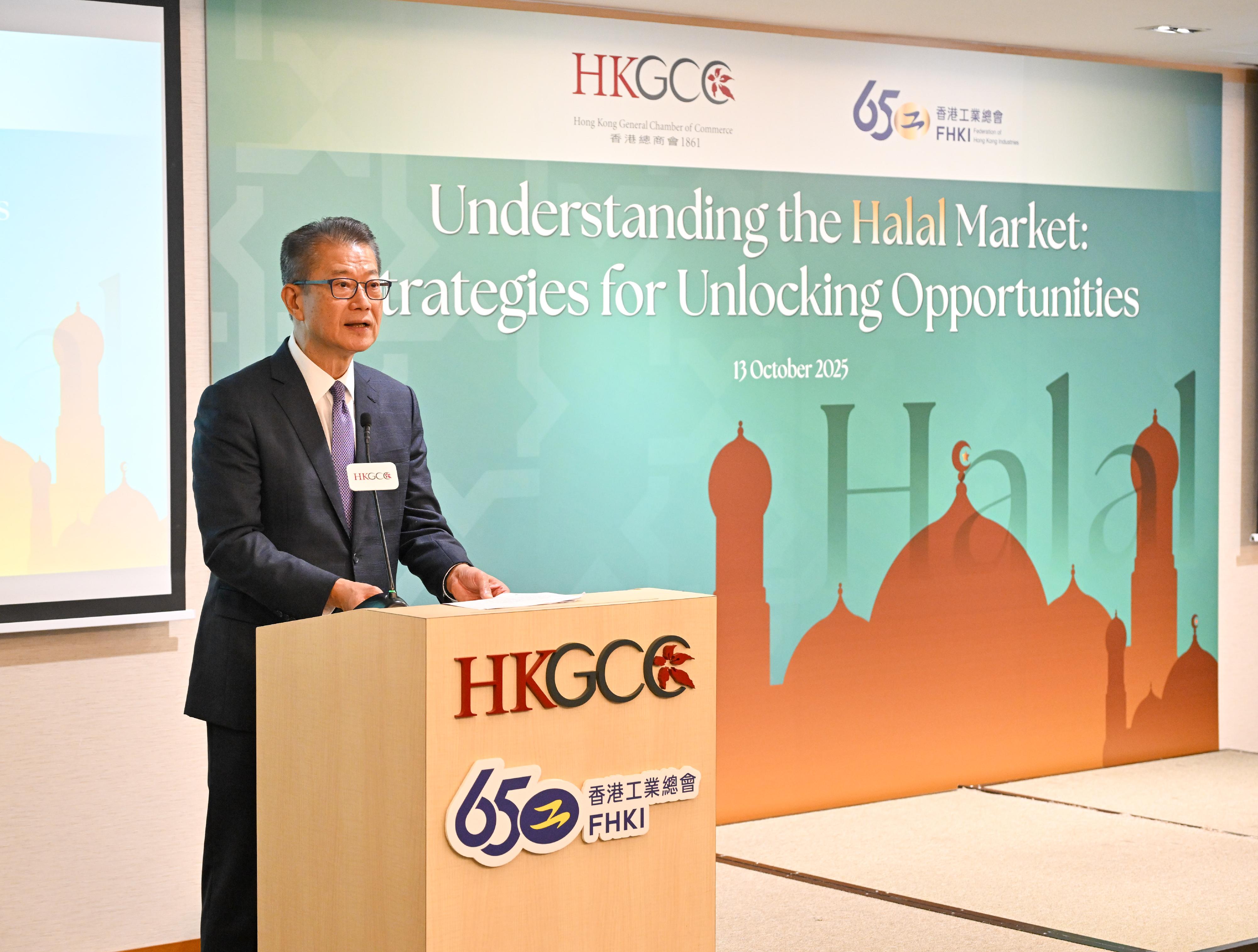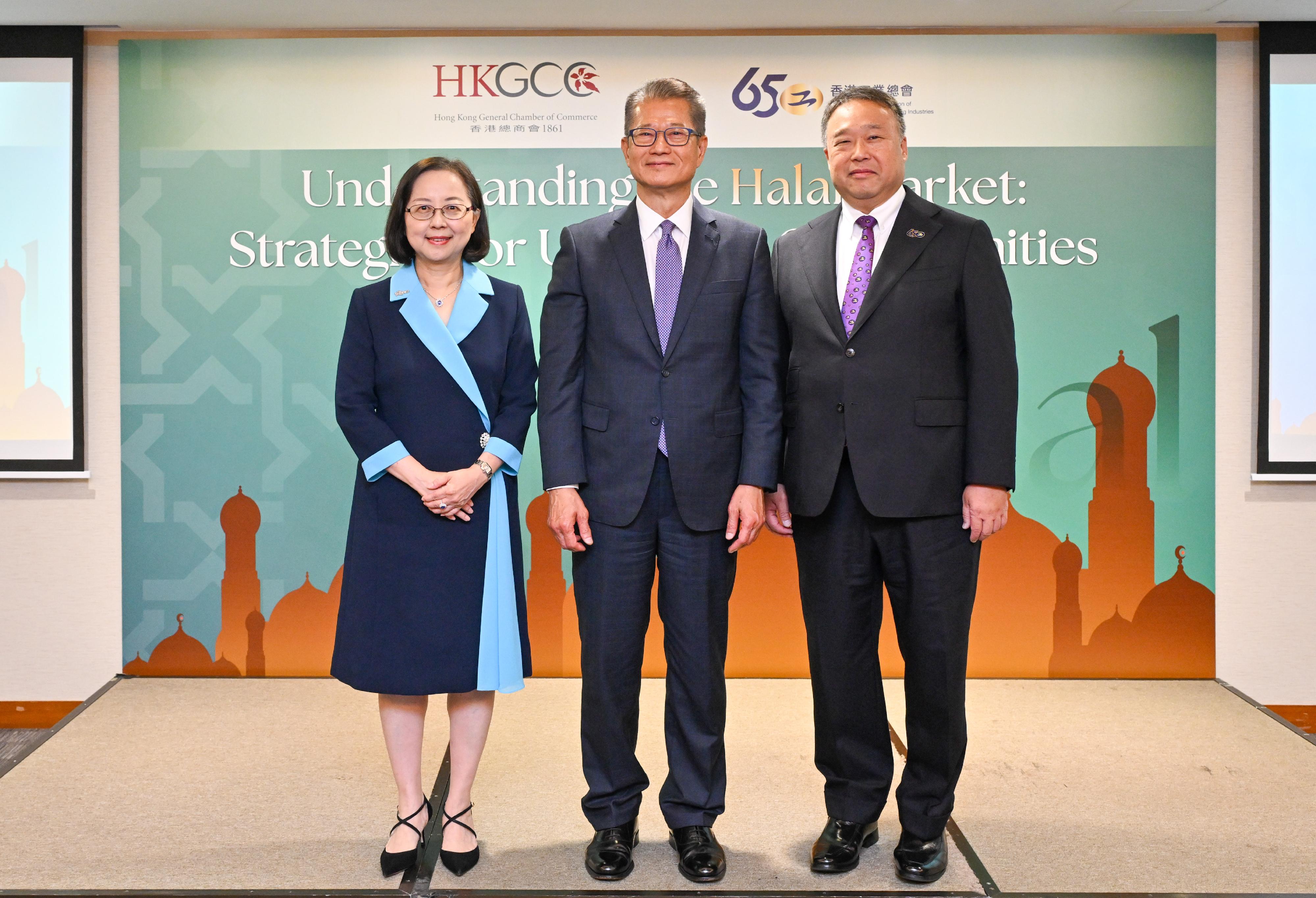Speech by FS at HKGCC x FHKI Forum - Understanding the Halal Market: Strategies for Unlocking Opportunities (English only) (with photos/video)
******************************************************************************************
Agnes (Chairman of the Hong Kong General Chamber of Commerce (HKGCC), Ms Agnes Chan), Anthony (Chairman of the Federation of Hong Kong Industries (FHKI), Mr Anthony Lam), Jeffrey (Member, Legislative Council - Commercial (First) and HKGCC’s LegCo Representative, Mr Jeffrey Lam), Mr Saeed Uddin (Chairman of the Incorporated Trustees of the Islamic Community Fund of Hong Kong), distinguished guests, ladies and gentlemen,
Good morning.
It is a real pleasure to join you today at this important forum as we explore how Hong Kong can tap into the vast and growing opportunities presented by the global Halal economy. My sincere thanks to the Hong Kong General Chamber of Commerce and the Federation of Hong Kong Industries for bringing us together for this timely and meaningful dialogue.
The global Halal economy
The global Halal economy is expanding at an impressive pace. The 57 member countries of the Organisation of Islamic Cooperation, or the OIC, currently account for around 8 per cent of the world’s GDP. Yet, their contribution to global growth is striking, reaching 15 per cent last year and projected to surpass 20 per cent by 2030.
These economies are undergoing deep structural transformation. In the Middle East, governments are diversifying beyond oil into sectors such as finance, technology, tourism and real estate. In Asia, countries like Indonesia and Malaysia are accelerating industrial development, capturing opportunities from shifting global supply chains. Foreign direct investment into OIC countries has risen substantially, now making up around 14 per cent of global inflows, nearly three times the level a decade ago.
At the same time, consumer markets in Muslim economies are expanding rapidly. According to the World Bank, household consumption in OIC countries has already surpassed US$5 trillion. Notably, this growth is driven by three key forces.
First, demographics. The Muslim world is home to over 2 billion people, with nearly 60 per cent under the age of 30. This represents a vibrant, young and increasingly affluent consumer base.
Second, the rise of ethical consumerism. Halal-certified products are valued for their safety, hygiene, and ethical standards. They are gaining popularity not only among Muslim consumers but also across global markets.
Third, digital transformation. E-commerce and online platforms are making it easier for Halal products to reach international audiences, further fuelling demand and opening new channels for trade.
These developments are unfolding as China strengthens its commitment to high-level two-way opening up, and deepens its engagement with Belt and Road partners as well as the Global South. Over the past decade, exports from the Chinese Mainland to OIC countries have grown by more than 80 per cent, reaching nearly US$600 billion. Imports from these countries have increased by around 60 per cent to US$450 billion. At the same time, outbound investment to OIC markets has surged by over 130 per cent, reaching US$100 billion.
Hong Kong’s role and strategic advantage
Ladies and gentlemen, the changing landscape is presenting new opportunities for us.
Under the “one country, two systems” framework, Hong Kong offers unparalleled connectivity with, and understanding of, both the Chinese Mainland and the international market. We serve as a trusted two-way platform for Mainland and Hong Kong enterprises looking to expand into Muslim economies, and for investors and entrepreneurs from these economies to access opportunities in China and beyond.
Looking ahead, our strategy centres on three fronts: strengthening trade and investment, advancing financial collaboration and enhancing cultural exchanges.
Strengthening trade and investment ties
First, about boosting two-way trade and investment. We are adopting a two-pronged approach: proactively reaching out to Muslim markets and bringing investors and business delegations from there to Hong Kong.
Over the past three years, the Chief Executive, my colleagues and I have led a number of high-level delegations to the Middle East as well as Indonesia and Malaysia. From my own experience, I am encouraged by their strong recognition of the “Hong Kong” brand, which is widely seen as a symbol of quality, good value and professionalism. As more Mainland enterprises look to go global, Hong Kong is in the best position to serve as a launchpad for them. That is why we have been inviting leading Mainland companies to join our overseas delegations, helping them explore the international market through Hong Kong.
Later this month, I will lead a delegation to Saudi Arabia, bringing together a strong team of Hong Kong and Mainland companies in sectors such as artificial intelligence, biotech, fintech, green energy and more.
Meanwhile, we are also expanding our presence in Muslim markets. A new Economic and Trade Office will open in Kuala Lumpur later this year, and we are pressing ahead with the plan to establish another office in Riyadh.
Here in Hong Kong, we are seeing a growth of bilateral investment events. The Investopia Summit with the UAE is a recent example. In July next year, we will welcome Saudi Arabia’s LEAP innovation conference to Hong Kong, its first edition outside the Middle East.
The Hong Kong Trade Development Council is featuring more Halal products and services in our trade shows and exhibitions, such as Halal food and logistics. We look forward to scaling up these efforts.
Advancing financial collaboration
The second focus is financial collaboration. As a leading international financial centre, Hong Kong is well positioned to support the growth of Islamic finance and cross-border financial products.
We already have the legal and regulatory frameworks in place to support Sharia-compliant instruments like sukuk. To date, the HKSAR Government has issued over US$3 billion in sukuk. In recent years, we have also made progress in ETFs with the Islamic markets, particularly Saudi Arabia. In 2023, Hong Kong launched Asia’s first ETF tracking the Saudi market. This was followed by the listing of two Hong Kong ETFs in Saudi Arabia last year. Earlier this year, Asia’s first investment-grade government sukuk ETF was launched in Hong Kong.
To support the long-term development in this space, we are also investing in talent. Professionals with experience in Islamic finance have been added to our city’s Talent List.
Deepening cultural exchanges
The third focus is cultural exchange. Tourism is an important pillar. Indeed, in the first eight months of this year, Hong Kong welcomed nearly 500 000 visitors from Indonesia and Malaysia, a 10 per cent increase year on year. Visitors from the Middle East were about 54 000, up nearly 40 per cent.
We are working to ensure that our tourism and hospitality sector is increasingly welcoming to Muslim travellers. Today, Hong Kong has over 190 Halal-certified restaurants and more than 60 Muslim-friendly hotels and attractions. The Hong Kong Tourism Board has introduced funding schemes to support Halal-certification processes and more dining options. I’m also pleased to note that in August, the Federation of Hong Kong Industries and the Islamic Community Fund launched the Hong Kong Q-Mark Halal Scheme, which will further strengthen the service quality and recognition of restaurants.
These efforts are already gaining international recognition. Hong Kong was recently named the “Most Promising Muslim-Friendly Destination” by the Global Muslim Travel Index. Our next step is to scale up our international promotion, so that more Muslim travellers will discover what Hong Kong has to offer. This will further reinforce our mutual business, investment and people-to-people relationships.
Of course, beyond tourism, we look forward to deepening cultural exchange with the Muslim world through mutual participation in each other’s festivals and programmes, ranging from film and music to the performing arts.
A shared opportunity
Ladies and gentlemen, the rise of the Halal economy reflects a broader shift that signals the growing economic influence of the Global South.
Hong Kong’s engagement with those regions is not only commercially strategic. It is also in alignment with our national development strategy and our role as a “super connector” and “super value-adder” between China and the world.
The path ahead is clear: to deepen engagement, to build new partnerships and friendships, and to co-create high-quality products and services that cater to the needs of the Muslim communities.
This is an endeavour that requires collaboration across sectors, industries and borders. Let’s work together to unlock new opportunities and bring benefits for our businesses and people.
On this note, let me once again thank the Hong Kong General Chamber of Commerce and the Federation of Hong Kong Industries for convening this forum, and I look forward to the insights from our distinguished panellists. I wish you all a productive discussion and a very successful future.
Thank you very much.
Ends/Monday, October 13, 2025
Issued at HKT 12:26
Issued at HKT 12:26
NNNN
Photo
Audio / Video
FS attends HKGCC x FHKI Forum - Understanding the Halal Market: Strategies for Unlocking Opportunities




